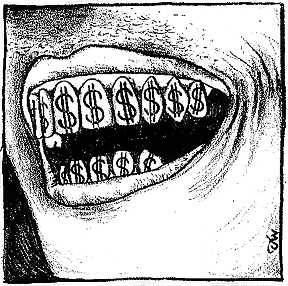


OF AND
RELATING TO
LABOR
Now imagine you are a tooth picker, a dentist with a private practice. If few other dentists are around, you'll have more cavities to fill than you ever wanted. Likewise, if many other dentists are in the area, you'll have fewer patients. But unlike the fruit picker, you'll have a choice: either give patients simply what they need and make less money, or milk your patients by selling them dreams of movie-star smiles in order to keep up a proper dentist's standard of living.

It's quite possible that having more dentists is assisting the rapid upward spiral of insurance costs in the U.S. Almost any American older than 30 can attest to the increased attention to cosmetic dentistry during the past couple decades ("Would you like your teeth whitened?"). Many younger Americans may have grown up believing any teeth not perfectly straight are a public embarrassment. Expensive procedures like implants and orthognathic surgery have surfaced in recent years. Exotic procedures, such as manipulating the jaw to treat backaches or hip problems, have surfaced in recent malpractice suits.
Dr Peter Milgrom at the University of Washington's School of Dentistry disagrees that there is an ethical problem innate in our US system: "There are people in any community who push the sales aspect to a great degree. Such people get their just desserts, hopefully." Milgrom advises, "If a dentist does not reveal the alternatives, then I believe it's wrong. If a dentist tells you that you have to have a crown, and you can't have an amalgam [a filling], in most cases that dentist is not offering all the alternatives."
But this advice may be hard to use for an average patient, who probably has little knowledge of dental alternatives, and whose dental insurance might not cover second opinions.
Just as you might expect, the US has more dentists per capita than almost any other country. Relative to its population, the Netherlands has only about two-thirds of the dentists that the US has, according to the New Book of World Rankings. The Dutch may more often have crooked or naturally yellowed teeth, but is it possible also that fewer dentists there feel the need to play a sales game with patients, and that dental insurance costs less for consumers?
The number of dentist in the Netherlands is kept low by planning. In fact, for six popular university studies, including dentistry, medicine, and veterinary science, the number of incoming students is limited by law.
As Dutch policymakers see it, there is simply more interest in some professional studies than there is a need. Many students are attracted to the lucrative nature of dental or medical practice, as well as to the heroic images in popular television programs about doctors. But two-thirds of the some 4,500 qualified applicants for medical school were turned away by Dutch universities this year by an academic lottery system in place since 1975, according to reports in the Dutch press.
Although Washington state's Higher Education Coordinating Board (HECB), does require proof of in-state need before okaying new schools of higher learning, there is no ongoing management of enrollment in Washington state. HECB's Jane Sherman states that "we try to provide incentives for institutions to manage it themselves." However for funding reasons, colleges are at times intent on simply maximizing enrollment.
WASHINGTON- A new national study ranks Washington state as having the most unfair tax system in the U.S. Families in our state who earn less than $28,000 pay 17.1 percent of their income in state and local taxes. The richest families, with incomes above $717,000, pay just 3.9 percent. (Washington Citizen Action)
OREGON- The 60 machinists at Voith-Sulzer Papertechnology in Portland have been on strike for more than 200 days now. Machinist international president George Kourpias has recently met with German unionists to enlist more support against the Swiss/German company that owns the plant. The company is pressing for wage reductions, mandatory overtime, and an open shop, and has been recruiting scabs from area community colleges. In other news, the Portland city council has passed a Fair Wages Contracting Ordinance which requires all companies that contract with the city to pay their workers a minimum of $7 per hour by July 1997. (NW Labor Press)
ILLINOIS- Kmart's new warehouse in Manteno came equipped with two management spies. Al and Janet Posego were paid by the employer to collect personal information on their coworkers, including their views on unions. When the Posegos were discovered, employee ire was enough to make a union organizing campaign succeed handily there this year, and a suit is in progress to open the records of the information collected. (Union Plus)
SEATTLE- Workers at the Lincoln Park Mini Mart in West Seattle on August 11 requested voluntary recognition from their employer as a bargaining unit of the IWW. They are currently out on strike. More than 70 percent of the convenience store's workers have become members of the IWW. The owner of the independent store is JW Webb of Seattle, who refused comment when contacted. Letters encouraging him to bargain may be sent to 9834 Marine View Dr. SW, Seattle 98136.
[Home]
[This Issue's Directory]
[WFP Index]
[WFP Back Issues]
[E-Mail WFP]





Contents on this page were published in the September/October, 1996 edition of the Washington Free
Press.
WFP, 1463 E. Republican #178, Seattle, WA -USA, 98112. -- WAfreepress@gmail.com
Copyright © 1996 WFP Collective, Inc.